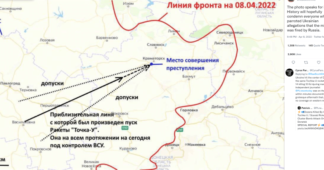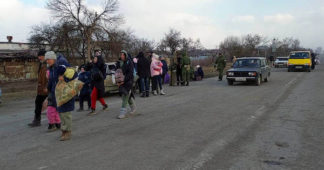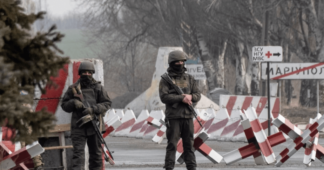May 27, 2022
The Russian Federation’s Joint Coordination Headquarters for Humanitarian Response, in co-operation with the authorised federal executive authorities, continues to carefully record the continuing egregious facts of the inhumane treatment of civilians by the authorities in Kiev, and use of social infrastructure for military purposes by Ukrainian armed formations:
militants of the territorial defence battalions have equipped firing positions and sniper points in residential buildings in Kharkov on Klochkovskaya Street and in Kostantinovka of the Donetsk People’s Republic on Tsiolkovskyi Street. However, no civilians have been evacuated from the building;
in Kramatorsk, units of armed nationalist formations have equipped strongholds in Lyceum No. 65 and the Kramatorsk Vocational Education Centre No. 47 on Yubileynaya Street, artillery and MLRS mounts have been placed and residents of nearby houses are being held in the premises of the educational institutions under the pretext of ensuring security;
in Kazachya Lopan, Kharkov Region, a poultry factory has ammunition depots in its workshops, military equipment in hangars, and factory personnel are forcibly held in the basement of one of its administrative buildings.
In Seversk, Donetsk People’s Republic, Tochka-U missile system and MLRS have been deployed at a grain storage facility located at the intersection of Tolstoy and Donetskaya streets. At the same time, nationalists are systematically shelling populated areas of the Donetsk People’s Republic, provoking the Russian Armed Forces to return fire in order to accuse Russian servicemen of allegedly indiscriminate strikes on civilian infrastructure, following a previously practiced scenario.
In addition, militants of the radical Right Sector nationalist organization in Velikonoselkovskyi district of Donetsk People’s Republic are openly calling for genocide against the Russian-speaking population and the Greek diaspora. Under the pretext of loyalty to Russia, civilians are physically abused, money, valuables and personal vehicles are seized ostensibly for the needs of territorial defence, and the proceeds from the sale of seized property are appropriated by unit commanders.
Such actions by Ukrainian neo-Nazis are acts of terror against their own population and war crimes without statute of limitations, and the officials of the Kiev regime and the direct perpetrators are war criminals and terrorists.
Despite all the difficulties and obstacles imposed by the Ukrainian side, over the past day, without the participation of Kiev, 19,598 people were evacuated from dangerous areas, 2,629 of them children, and in total, since the beginning of the special military operation, 1,502,055 people have already been evacuated, of which 247,458 are children. The state border of the Russian Federation was crossed by 211,292 personal vehicles including 3,159 per day.
More than 9,500 temporary accommodation centres continue to operate in the regions of the Russian Federation. The refugees are dealt with on an individual basis and are promptly assisted with various pressing issues relating to onward accommodation, employment assistance, places for children in kindergartens and educational institutions, and the provision of entitlements to social benefits.
Over the past 24 hours, the hotline of the Interdepartmental Coordination Headquarters of the Russian Federation for Humanitarian Response, federal executive authorities, constituent entities of the Russian Federation and various NGOs received 109 requests from foreign and Ukrainian citizens to evacuate to Russia, the Donetsk and Lugansk people’s republics, as well as to the Russian Armed Forces-controlled areas of Zaporozhye, Nikolaev, Kharkov and Kherson regions. In total there are 2,756,697 such appeals from 2,136 locations in Ukraine in the database.
In addition, 70 foreign vessels from 16 countries remain blocked in 6 Ukrainian ports (Kherson, Nikolaev, Chernomorsk, Ochakov, Odessa and Yuzhniy). The threat of shelling and high mine danger posed by official Kiev prevents vessels from entering the high seas unhindered.
As a result of the measures taken by the Russian Navy, the mine threat in the waters of the port of Mariupol has been eliminated and measures are being taken to restore the port infrastructure.
The Russian Armed Forces have created conditions for the operation of two maritime humanitarian corridors, which are safe lanes for ships:
in the Black Sea – to leave Kherson, Nikolaev, Chernomorsk, Ochakov, Odessa and Yuzhnyi ports in a south-westerly direction from Ukraine’s territorial sea, 139 miles long and 3 miles wide;
in the Sea of Azov, to leave Mariupol port 115 miles long and 2 miles wide towards the Black Sea.
Detailed information in English and Russian on the modus operandi of the maritime humanitarian corridor is broadcast daily every 15 minutes on VHF radio on 14 and 16 international channels in English and Russian.
At the same time, the Kiev authorities continue to avoid engaging with representatives of states and ship-owning companies to resolve the issue of ensuring the safe passage of foreign vessels to the assembly area.
The danger to navigation from Ukrainian mines drifting off their anchors along the coasts of Black Sea states remains.
The Russian Federation is taking a full range of comprehensive measures to ensure the safety of civilian navigation in the waters of the Black Sea and the Sea of Azov.
Demining detachments of the Russian Armed Forces and the EMERCOM of Russia are carrying out land and facility clearance tasks in the territory of the Donetsk and Lugansk people’s republics. A total of 2,161.52 hectares were checked (including 194.88 hectares during the day), 35 buildings (including 13 socially important facilities), 1 bridge and 9.64 km of roads. 10,959 explosives were detected and defused, 248 of them during the day.
Federal executive authorities, together with the subjects of the Russian Federation, various public organizations, patriotic movements, continue to accumulate humanitarian aid. More than 27 tonnes of basic necessities and food kits, including baby food and life-saving medicines, have been prepared at collection points.
The greatest contributors to the relief effort were:
Ministry of the Russian Federation for Civil Defence, Emergencies and Elimination of Consequences of Natural Disasters, Ministry of Industry and Trade of the Russian Federation, Ministry of Transport of the Russian Federation, Ministry of Economic Development of the Russian Federation, Ministry of Digital Development, Communications and Mass Media of the Russian Federation, Federal Service of State Registration, Cadastre and Cartography, Federal Agency of Maritime and River Transport, Ministry of Culture of the Russian Federation, Federal Agency for Nationalities;
republics of Buryatia, Dagestan, Crimea, Tatarstan, Chechen Republic, Altai, Trans-Baikal, Krasnodar and Primorsky territories, Arkhangelsk, Belgorod, Bryansk, Kursk, Leningrad, Moscow, Rostov, Samara, Sverdlovsk, Tula, Ulyanovsk, Yaroslavl regions, as well as Moscow city;
among political parties and non-profit organisations: United Russia, the People’s Front All-Russian Public Movement, the All-Russian public organisation of veterans Boyevoe Bratstvo, the Russian Humanitarian Mission, the open joint-stock company Russian Railways and the All-Russian public and state organisation Russian Women’s Union.
. Since March 2, 23,346.9 tons of humanitarian cargo have already been delivered to Ukraine, 1,061 humanitarian actions have been carried out, including 7 actions in Kharkov and Kherson regions, as well as in Donetsk People’s Republic, during which 415.6 tons of basic necessities, medicines and food were transferred to the civilian population of the liberated areas.
On May 27, 6 humanitarian actions have been planned and are currently being carried out in Kharkov and Zaporozye regions, in Donetsk People’s Republic, during which 277.4 tons of basic necessities, medicine and food will be distributed.
Directorate of Media service and Information
We remind our readers that publication of articles on our site does not mean that we agree with what is written. Our policy is to publish anything which we consider of interest, so as to assist our readers in forming their opinions. Sometimes we even publish articles with which we totally disagree, since we believe it is important for our readers to be informed on as wide a spectrum of views as possible.











